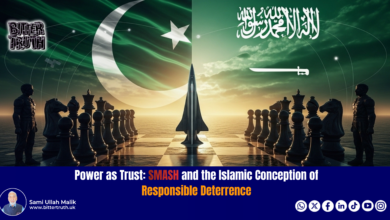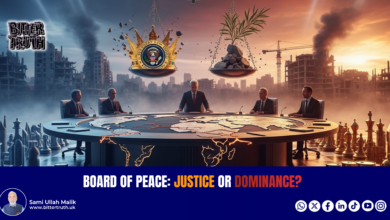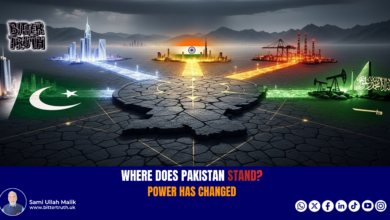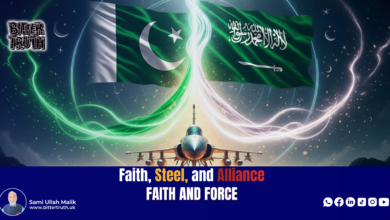Gulf Politics and American Military Power: A Free Hand for Israel
America and Israel: A New Battle for Influence in the Middle East
After Iran’s recent ballistic missile attacks on Israel, the atmosphere in the Middle East feels like the “calm before the storm.” On one hand, the world awaits Israel’s response, while on the other, questions are being asked of US President Joe Biden, thousands of miles away, regarding the nature of this response. This situation is further complicated by the hustle and bustle of the upcoming US elections. The key point here is that beyond the US’s close alliance with Israel and its historic role in the region, American forces are also present in the Middle East. It is no longer a secret that Israel’s role in the region is that of a soldier of the United States, who is charging too much for American interests.
On Tuesday night, when Iran launched approximately 180 missiles at Israel, the US had already given Israel prior warning. President Biden and other key US officials monitored the situation live from the White House’s Situation Room. In response to the attacks, the US quickly condemned them, labelling them as “unacceptable” and claimed that American naval ships had intercepted multiple Iranian missiles.
President Biden had already ordered an increase in US troop presence in the Middle East. Earlier, in late September, the US deployed the aircraft carrier USS Harry S. Truman to the Eastern Mediterranean, which is expected to be fully operational by the end of the week. According to the US Department of Defense, more than 40,000 American troops are stationed in various countries across the Middle East. But why are such large numbers of US forces positioned thousands of miles from home in the Middle East? Answering this question is crucial to understanding the complexities of the ongoing conflict and the impact US military presence has on the balance of power in the region.
In fact, the US’s presence in the region dates back to the 1940s, specifically in the Persian Gulf, with a significant increase following the 2001 World Trade Center attacks. In 1945, the US established its first airbase in the region in Dhahran, Saudi Arabia.
According to the US Department of Defense, approximately 40,000 American troops are currently stationed in the Middle East. Before October 7, the US had around 34,000 troops in the region, but an additional 6,000 have been deployed over the past year. The largest US base in the Middle East is Al Udeid Air Base in Qatar, which was established in 1996.
In addition to Qatar, US troops are present in Bahrain, Kuwait, Saudi Arabia, the United Arab Emirates (UAE), Syria, Jordan, Egypt, Cyprus, and Iraq. The US has multiple bases in Kuwait and two bases in Saudi Arabia. “Saudi Arabia, Qatar, the UAE, Oman, Kuwait, Jordan, and Bahrain also benefit from the protection provided by the US.”
It may come as a surprise that over 2,000 American personnel are still stationed in Iraq, primarily around the Ain al-Asad Air Base and facilities like ‘Union III.’ Additionally, the US military’s Tower 22 base in Jordan, located in the northeast near the borders of Syria and Iraq, came under attack on January 28 this year, resulting in the deaths of three US Army Reserve soldiers. The attack was attributed to the Iranian-backed Iraqi militia Kata’ib Hezbollah.
Besides military bases and troops, the US Navy is also present in the Red Sea, the Gulf of Oman, and the Mediterranean Sea. According to the US Department of Defense, two more American aircraft carriers are positioned in these waters. USS Abraham Lincoln is already near the Gulf of Oman, while USS Truman has taken up position in the Mediterranean, meaning all three branches of the US military—land, sea, and air—are present in the region.
But why are US troops stationed so far from home in this region? The answer lies in multiple reasons behind the US’s longstanding presence in the Middle East. Located between Asia and North Africa, the Middle East is rich in natural resources and occupies a strategically crucial position on the global map, making it central to the foreign policies of many countries, especially the US.
Since the discovery of oil in the Saudi city of Dhahran in 1938, the value of oil in the global economy has steadily risen. “As oil became more significant in the global economy, its strategic importance also increased.” Many mistakenly believe that the US is in the region solely for oil, but in fact, the US is largely self-sufficient and was the largest oil producer in 2022, surpassing Saudi Arabia by 30%. The real reason for the US’s presence here is to monitor other nations, particularly European countries and China, and their access to Middle Eastern oil. However, there are several other crucial factors at play as well.
The Middle East has long been caught in the Cold War between Russia and the US, and the belief still persists in America that wherever it leaves a vacuum, Russia will fill it. However, historically, this notion has not always been accurate. The United States’ sympathies toward Israel were evident just 12 minutes after the signing of the 1948 treaty, justifying it by saying that what happened to the Jews during World War II was wrong, and it sees it as its right to fulfil the dream of Jews for an independent state. In reality, the US has assumed the role of a “global policeman,” and because the Middle East is a vital region through which global maritime trade routes pass, it considers its presence and dominance in the region a right.
On 14 May 1948, David Ben-Gurion announced the establishment of Israel, and following its creation, the United States, Britain, France, and China recognised it. Although India had secret relations with Israel from the beginning, it officially recognised the country in 1992. Additionally, three Muslim countries, apart from the UAE and Turkey, have established full diplomatic relations with Israel, and Saudi Arabia allowed travel to the country in 2018.
Similarly, after the September 11 attacks in 2001, when the US decided to invade Iraq, more than 100,000 troops were sent to the Iraq war. However, the uncertainty that arose after the US occupation led to the emergence of the so-called Islamic State (ISIS), whose formation was even acknowledged by US Secretary of State Hillary Clinton. It is also a part of history that this organisation has waged war solely against Islamic countries. Moreover, one of America’s major rivals, Iran, is also located in this region. According to a renowned American think tank, the US has significant economic, political, and military assets in the Middle East, and it deems it necessary to maintain a certain number of troops in the region to protect these interests. With multiple air bases in the region, the US can respond whenever needed, and often it influences the situation without taking any direct action. The US justifies its presence by blaming the growing influence of China and Russia in the region.
Due to the US military presence in the region, Israel’s unchecked use of force has become a threat to the entire world. In this regard, Youssef Kain, the coordinator of the Middle East Programme at the Wilson Centre’s Policy Institute in Washington, states that the US presence in the Middle East plays an essential role in shifting the balance of power in Israel’s favour in four keyways. First, American political support helps legitimise Israel’s actions, particularly in international institutions. Second, US presence in the region helps limit local and regional conflicts, bringing stability to countries like Syria that have been embroiled in conflicts for years, thereby giving Israel more freedom. Third, Israeli and American interests, particularly economic ones, align. And finally, Israel benefits from the security, intelligence sharing, and strategic support provided by the US.
Those with a deep understanding of US international policy believe that “Israel is a small state, and small states often face the issue of lacking ‘strategic depth,’ meaning they do not have the territorial expanse to fight against regional enemies like larger powers do. The US presence in the Middle East acts as a deterrent to Iran and its supported proxy groups. US naval fleets are stationed in the Red Sea, Mediterranean Sea, and the Indian Ocean, forming an integrated network. That is why whenever Iran attacks, the US is immediately aware, and either warns Israel or intercepts those missiles itself.”
Throughout this century, the US has been directly involved in wars in Iraq and Syria and indirectly involved in several proxy wars in the Middle East. However, analysts believe that based on past experiences, the US would prefer not to be part of a major new war in the Middle East. The US’s national interest lies in ensuring that the conflict remains limited and does not escalate. Iran also shows “strategic patience,” and there was an unspoken agreement between Israel and Iran that they could attack each other’s proxies but would refrain from direct conflict. The US would want this balance to be maintained.
However, Netanyahu has acted in the interest of Israel, not the US, and has used the US election season to expand the war, knowing that he would receive bipartisan support from both Democrats and Republicans. Once a new American administration takes over, particularly the Democrats, they may have a mandate to restrain Israel, while Trump has hinted at destroying Iran’s nuclear plants. If you look at the US national security documents, their strategic goal is to contain the rapidly rising China, so any issue that diverts attention from this objective is not in their national interest. Remember, no matter how important China is to the US, America will always look for opportunities to assert its influence wherever it can globally.
This situation may change, but for now, the United States is fully supporting Israel, and as long as this remains the case, Israel will continue to pursue its ethno-nationalist agenda and expand its influence. According to the Executive Director of the Institute for Social Policy and Understanding, “Despite the fierce competition from Russia and China, the U.S. is still the only global power with significant influence in the Middle East, which it uses to shift the balance in favour of Israel. The U.S. can influence most countries in the region, and it uses this leverage, when necessary, to protect Israel. This military and economic influence, combined with the public and private support of Israel, emboldens Israel to violate international laws.”
To remind the readers, on August 13, 2024, Pentagon Press Secretary Air Force Major General Pat Ryder said during a news conference that there is still time for diplomacy in the Middle East, but U.S. forces are being deployed to the U.S. Central Command area of responsibility as a deterrent. He mentioned that the U.S. Air Force has moved “F-22 Raptor” jets into the region, and the U.S. Navy has deployed the “USS Abraham Lincoln Carrier Strike Group” along with “F-35C Lightning” aircraft. In addition, the guided-missile submarine USS Georgia is also on standby for any emergency.
Ryder stated that there are currently around 40,000 U.S. service members in the CENTCOM area, closely monitoring the situation in the Middle East. Secretary of Defense Lloyd J. Austin is in almost daily contact with Israeli Defense Minister Yoav Gallant and other regional partners. Austin has reassured Gallant of America’s firm commitment to take every possible step in Israel’s defense. These adjustments in U.S. military posture across the Middle East, in light of increasing regional tensions, are meant to enhance force protection, reinforce support for Israel’s defense, and ensure the U.S. is prepared to respond to various types of emergencies.
Iran and Iranian-backed groups have threatened to attack Israel, and the U.S. is taking these threats seriously. However, the focus remains on de-escalating tensions, facilitating a ceasefire, and securing the return of hostages. The U.S. seeks to prevent a large-scale regional war in the Middle East. No one wants to see further escalation, nor a broader regional conflict. Hopefully, we won’t find ourselves needing to deploy these capabilities, but if required, we will act in defense of Israel.
The question now arises: what is the U.S. intending to do by giving Israel a free hand in the region, as indicated by Pentagon Press Secretary Air Force Major General Pat Ryder’s news conference? Iran did not launch missile strikes on Israel until 50 days after Ryder’s press conference, but during this period, why did the U.S. not curb Israel’s increasing brutality?






